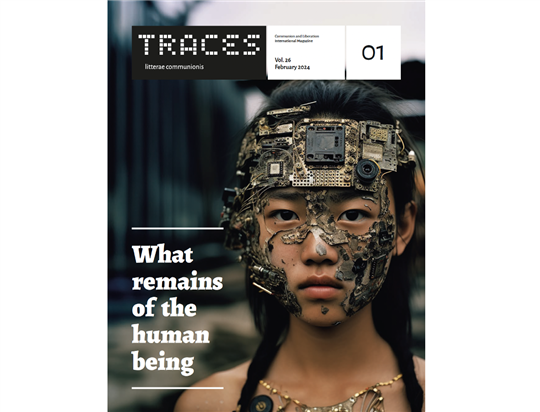
Traces, no. 1, February 2024
HallucinationsArtificial intelligence is at the center of the world, the protagonist of debates in every sphere. Even for the pope, who dedicated his Message for Peace to it, it is among the priorities for reflection, raising urgent questions about its impact, from the dignity of the individual to international dynamics to armed conflict. While these “intelligent machines” are causing people to discuss the need for global governance, they already boast computing power that is a million times greater than before, which has surprised and frightened even those who created them. They provoke excitement and fear precisely because they are no longer conceived merely as tools. They reproduce or imitate human cognitive capacities and (when trained) generate content; they provide answers but do not ask questions; they threaten authenticity with verisimilitude and so-called “hallucinations” that are plausible but not necessarily true.
The Close-up section is therefore dedicated to this avatar of unstoppable progress, offering several perspectives on the radical questions it opens up with respect to the meaning of knowledge and our relationship with reality and truth. We asked various interlocutors how artificial intelligence challenges our conception of life, what it reveals about the fact that the person is a “unitary being, [which is] irreducible.” This is how psychoanalyst Miguel Benasayag defines the person in the dialogue that opens the issue. To the question, “What remains of the person?” when so much is delegated to algorithms and machines, he replies: “Everything.” It is not just a question of affirming this: it is decisive to see that in the face of artificial intelligence, the human is not lost if we are present with our whole selves. It is interesting that the key to everything is, more and more, examining in greater depth the nature of the only subject. Only thus will persons also be able to program and use the formidable power of these instruments and to do so responsibly, loving the truth, without manipulating or allowing themselves to be manipulated. Accepting and not running away from the unprecedented provocation of this revolution causes the constituent factors of life to emerge more powerfully. In the fourth episode of the podcast Il senso religioso [The religious sense], Fr. Giussani–whose unpublished speech we publish in this issue on its nineteenth anniversary–says: “If I am engaged with my experience, if I look at my subject in action in the present, two types of factors emerge that are irreducible to each other. The great philosopher Jaspers said: ‘All empirical causalities and biological processes of development... would seem to apply to man’s material substratum, not to himself.’ There is something in man that exceeds.”
We are well aware that not everything can be predicted and calculated, but what is it about us, at this moment, that emerges as truly inaccessible to even the most prodigious instrument?